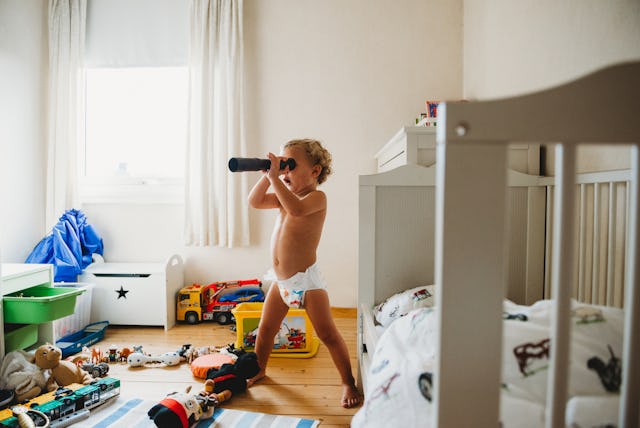I've Ditched Potty Training My Almost-4-Year-Old — & Pros Say That's Totally OK
This unspoken rule is total bullsh*t, according to the experts.

Every parent has dealt with the occasional family member or nosey stranger who gives unsolicited advice to you at parties or the supermarket. Shoo, fly; don't bother me! Right? But what about when you're the nosey critic being hard on yourself?
Mom guilt is unavoidable, and while I have gotten good at giving myself grace as I navigate parenthood, potty training has me questioning if I do enough. My son is 3 1/2 years old and still does not use the potty. He's not even curious. Sure, for a good bribe of sweets or a McDonald's Happy Meal, I can get him to use it, but there's no organic curiosity or sense of readiness being shown.
I've told myself, "Oh, that's OK, he'll tell you when he's ready." Then his second birthday came, and then the third. Now we are approaching the fourth, and well, those sureties have gone out the window. "Boys are usually ready later," I get from friends. But what's later? Is there such a thing as too late?
Solidarity in Transparency
On a recent visit to our local library, I sat down next to another mom who was there with her 4-year-old twin boys. We started chatting, and she asked me if my son was potty-trained. I reluctantly told her no and that he hadn't shown much interest, but I was letting him take the lead.
I could see the relief on her face as she told me that her sons only became potty trained recently, and one still wears a diaper to sleep. Suddenly, we found solace in each other's stories, and it illuminated to me that I was not the only one. I started asking other moms at the park or gatherings; sure enough, other parents were having the same experience and not talking about it.
The unspoken rule that kids should have it down by three has made parents reluctant to be honest about their older potty training experiences. Let's be transparent: It's normal for your kid to potty train a bit older, and according to one specialist, it's a luxury!
Let’s Talk Lifestyle
Rebekah Diamond, MD, a pediatric hospitalist, tells us, "There's no one-size-fits-all plan or timeline for toilet training. The only reasons to start earlier or have a deadline are logistical. Otherwise, modifying your approach however needed or ditching official training altogether is fine! Focusing on parent and child readiness, as your lifestyles allow, is the key to success. This often means that waiting to promote toileting behavior until later is actually better for your child and your family."
The more I researched, the more I learned that potty training is predominantly governed by the parent's lifestyle — and it turns out that COVID kids are their own category. If you had children around or during the pandemic, it's likely that your kids didn't go to daycare or had very limited social interactions. More home time means less pressure to potty train.
"I meet with lots of parents who are struggling with potty training, and many of them are 3.5+. One of the interesting things that I am seeing is that, for many children, potty training isn't coming together until much later, which I attribute to the pandemic. Many of these children were COVID babies and didn't have the social role modeling that can be an important part of children being interested in using the potty," Christine Brown, founder of Bella Luna Baby, says.
When the pandemic started, I left my corporate job and worked for myself remotely at home. Due to my lifestyle, I chose not to pursue any daycare and plan to wait until kindergarten. Until then, he will be home with me or my in-laws. This means that later potty training isn't the lazy option; it's the one that makes the most sense for me!
"The biggest lifestyle difference is school! Many, if not most, preschools require children to be fully potty trained, which adds pressure to complete this milestone at a faster pace," Allison Jandu, The Potty Training Consultant, shares.
To Pee Or Not To Pee, That Is The Question
So, for parents like me, is potty training necessary at all? According to Diamond, you can ditch it altogether. "Most kids will learn how to toilet on their own. Really. There's no science to support the idea that a formal training plan is needed at all. Instead, science shows that norms and strategies around when and how kids learn to toilet on their own vary dramatically across cultures, with plenty of children acquiring these skills in an extremely unstructured, deadline-free way," she explains.
Lifestyle also encompasses the level of readiness the parent has, not the child. Frankly, I was not ready to potty train when my son showed signs of being ready.
"I often see parents with older children who are struggling with potty training, and they are very hard on themselves and even embarrassed that they haven't potty trained yet," Jandu adds. "That said, every child is so vastly different, and many children won't be ready to undergo this big transition until they are a bit older. Additionally, many parents find that they aren't ready to potty train their toddler until they are closer to 3-4, and that's OK too!"
Diamond said it best when she told me, "Your strategy has the best chance of working when you feel empowered as a parent."
Whether you potty train early, do it for school, or because you're sick of buying diapers — there is no right way to do this. If older potty training is what is happening most organically for you, it's normal and healthy for your family to stick with that.
Let's own the way we choose to parent. I'll go first: "My name is Krystal, and I've totally ditched potty training!"
This article was originally published on